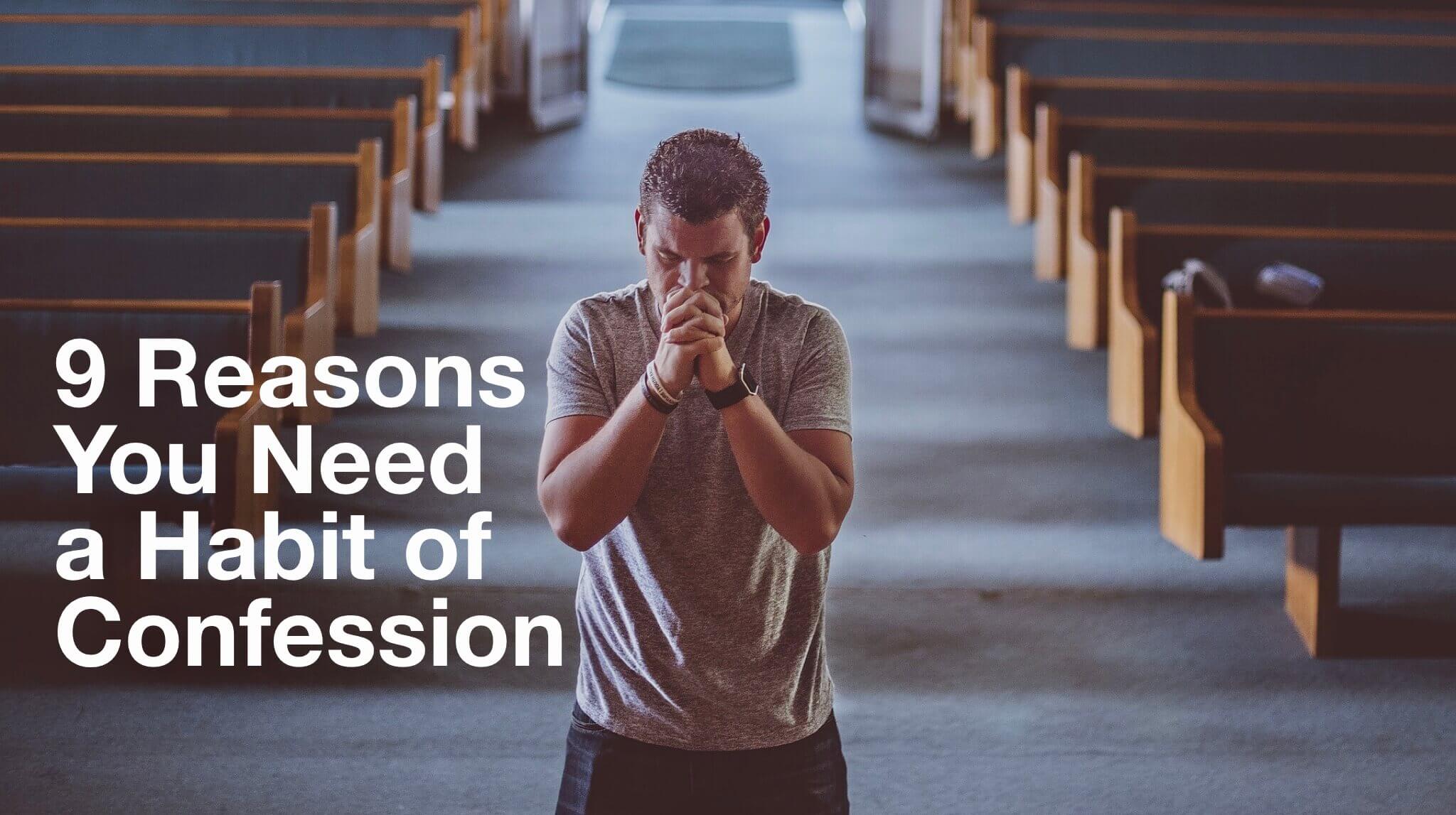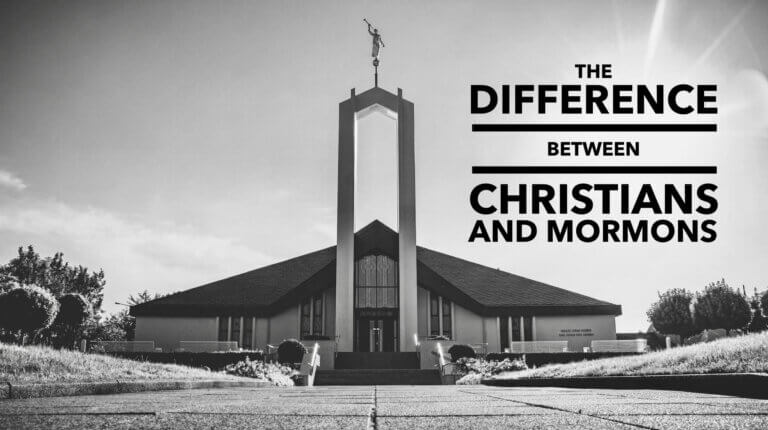9 Reasons You Need A Habit of confession

In 1517 Martin Luther nailed his 95 Theses to the door of the Wittenberg church, sparking the Protestant Reformation. The first thesis was, “When our Lord and Master Jesus Christ said, ‘Repent’ (Mt 4:17), he willed the entire life of believers to be one of repentance.”
The Christian life is one of repentance.
If you think about it, isn’t that true?
Our nature as human beings is inherently broken. Left to our own devices, we all willingly wander into sin.
We all sin and fall short of God’s righteousness (Rom 3:23), but God offers forgiveness to all who believe in him and confess their sins (1 John 1:9).
Repentance is simply confessing our sins to God and then turning away from that sin.
Without confession of sins, there can be no repentance. We can’t turn away from sin without admitting our guilt first.
So as Luther said that the Christian life is one of repentance, we could also say the Christian life is one of confession because we cannot repent without first confessing.
Three Ways to Confess
For whatever reason, Protestant Christians have an aversion to the word confession. It evokes imagery of the Catholic practice of sitting in a confessional booth, confessing your sins to a priest.
We do not feel like we need this kind of confession, because a priest has no power to forgive sins. Only God can do that.
But regular confession is a forgotten spiritual practice that we should not so easily dismiss.
Confessing sins to God and one another has been a Christian practice since the foundation of the church.
There are three ways we might practice confession:
1. Private: You and God
Private confession is when you pray to God, tell him about your sin, and ask for forgiveness.
Confessing your sins to God seems like the easiest to do because he already knows about it anyway. So many people never take it further than this.
2. Personal: You and another
Personal confession is admitting your sins to a trusted believer—a pastor, friend, or spouse. You’ve already confessed to God, and you take it a step further by opening up to another person for accountability, support, and help to overcome sin.
Personal confession could also be confessing to someone that you have sinned against, admitting your wrongdoing and asking for their forgiveness.
3. Public: You and everyone
Public confession is when you admit your sin publicly.
Baptism is the most common practice of public confession of sin. You’ve confessed your sin to God, but you also publicly admit that you are a sinner in need of forgiveness.
Regrettably, the other way we tend to see public confession is only after a person in a leadership role is caught in sin. Their sins have already become public, and they just admit it and ask for forgiveness. While still a form of confession, most wonder whether the person would have confessed if their sin had remained hidden.
Benefits of Confession
Confession can be a terrifying thought. It may be less intimidating to talk privately to God, but why would anyone ever want to talk about their deepest, darkest secrets to someone else too?
I can think of at least nine reasons:
1. Confession leads to forgiveness
This is the greatest and most obvious reason.
1 John 1:9 says, “If we confess our sins, he is faithful and just to forgive our sins and to cleanse us from all unrighteousness.”
We need forgiveness. We have sinned against God, and we are deserving of punishment for our rebellion. But God offers forgiveness to all who believe in him, confess their sins, and repent.
2. Confession raises self-awareness
To confess you have to admit that you aren’t perfect. You have vices and wrestle with specific temptations.
You need to examine the motives of your heart and admit that you’re not strong enough to overcome sin without help.
When you stand before a holy God, you see yourself more clearly. He is perfect, almighty, and blameless; You are not.
3. Confession empowers you to overcome sin
Confession invites God and the power of the Holy Spirit to help you overcome your sin.
Also, when personal or public, you get further accountability. You no longer have to face the sin alone.
Sin always wants to be kept hidden in the darkness. When your darkest sins are brought into the light, they lose power.
4. Confession feels good
There’s a wonderful feeling of peace that you receive immediately after confession.
You may not even realize it, but you’ve been carrying a tremendous weight of guilt and shame because of your sin.
When you confess your sins, Christ lifts that burden from you (Matt 11:28).
It feels good.
5. Confession strengthens your prayers
James commands us, “confess your sins to one another,” because “The prayer of a righteous person is powerful and effective” (James 5:16).
This implies that unconfessed sin will somehow hinder the power and effectiveness of your prayers while confessing your sins will strengthen your prayers.
6. Confession builds integrity
Your sins will find you out (Num 32:32). How many leaders have we seen fall because of hidden sin?
A regular practice of confessing your sins to God and others strengthens your integrity. You won’t have to worry about some dark secret coming to light and wrecking your life because you’ve already dealt with it and have no secrets.
7. Confession cultivates humility
Pride is one of the most subtle and dangerous sins of all. We are all at risk of inflated egos and thinking too much about ourselves.
But confession requires humility. You must be willing to look in the mirror and see how your words, thoughts, attitudes, or actions have harmed others and grieved God.
8. Confession restores relationships
When you sin against someone, you harm that relationship.
Just as confession is the first step in receiving forgiveness and being restored to a right relationship with God, admitting your fault in a damaged relationship is the first step to forgiveness and healing in that relationship as well.
9. Confession encouraged others
When you dare to admit your faults to others, it doesn’t just help you. Your courage and honesty will inspire others to open up about their struggles as well.
When you lead in confession, others are encouraged to follow.
Plus, it’s encouraging for others to hear that they are not the only ones who struggle with sin.
Where there’s a lack of confession, there’s a false impression that everyone else is perfect and you’re the only one struggling.
I Must Confess
I sin and fall short every day. We all do. And that is why we all need to make confession a regular habit.
I admit that confession is painful. Nobody wants to do it. Confronting your demons is terrifying. It always seems easier at the time to keep them buried, even though you know they can’t stay hidden forever.
But the benefits of confession far outweigh the risk.
We need more confession in our life and our community.
So here’s my question for you: What do you need to confess, and who do you need to confess to?






question: do you need to confess your past sins to your former pastor? Sins that made you leave your post unexplained or without any reason. Does it matter the timeline?